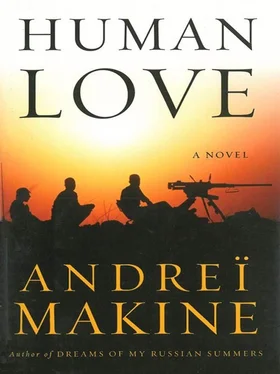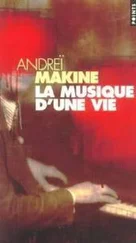He came to his senses on hearing a cry. A woman’s voice, a brief exclamation, as if of joy, then the gunshot. Despite the throbbing of the blood in his temples, he picked up what the soldiers were saying: the Zairean woman they had just shot had diamonds concealed in her mouth… The young Russian was at the window again. Elias guessed what he could see. A dead woman, a soldier extracting tiny gray granules from her mouth.
Then it came to him that the only true view of the world was just this one: in the dense humidity of a certain night men cluster around a woman who has just died, gripping her still warm body, which they have all had their way with. Unhurriedly, one of them rummages in the woman’s mouth with his index finger; the moon is almost full (clarity!); a drugged child sleeps, leaning against a tree, and in towns and villages a few dozen miles away life continues, people prepare to go to bed; in Luanda a couple discuss the fat left in a frying pan; in Lusaka a young woman sleeps beside her diplomat husband whom she has never loved; in Paris a female intellectual writes a text about the betrayal of revolutions; while beneath the mud of the Russian plains, beneath the rocky American deserts, gigantic cylinders sleep, crammed with death and capable of taking off at any moment and obliterating this land bathed in the blue light of the moon. And at the very heart of this insane world there is respite, a wooden house, a woman who walks out onto the snow-covered front steps at nightfall and gazes at the white road below the terraced treetops of the dark taiga… He could knock on the door of that house tomorrow, and he would be welcomed as if he were returning forever.
For a moment longer he succeeded in seeing the world thus, in the totality of its interconnected lives. Then his vision became blurred; such a perception was unendurable for one human being. His eyes had only borne it because death was at hand, and this made him more than a man.
Feverish whispers already seemed to be reaching him from the far side of life. He moved his head, and the pain from a cut reopening in his shoulder woke him up. “Why are they taking so long to kill her?” Elias recognized the Russians voice, words distorted by fear. He again wanted to reassure him, tell him about the Cuban commandoes who would doubtless attack at dawn (the previous day he had heard their gunfire, the kind of gunfire that draws the enemy into responding, thus giving itself away). He was going to survive, that young man, perhaps even to end up with a vivid memory of this night: the intimacy with death, a glimpse of madness, and then that dead woman spewing out diamonds… Scenes for a book he might well write in later life, as white people do, to draw a line under their years in Africa. In these pages everything would be clear. Heroes, villains. And everyone would have a life story that began at point A to arrive at point B. And yet when death stares you coolly in the face, you realize that in your life there are just a few hours, of sunlight or of darkness, a few faces, to which you return continually even as you draw further away from them … Fishermen on the island of Cazenga, a woman waiting for them. Then the same woman sitting on the threshold of a hut, a child crouching at her knee, his face buried in the crook of his mothers arm. Then that moment when he was most intensely himself: a halt at a little station in the snow, a young woman climbing onto the footboard of a train… And that winter dusk, too, an elderly woman standing on the front steps of her house, watching a bend in the road…
He regained consciousness as he felt a hand unceremoniously searching through his jacket pockets. In his mind the words formed in Portuguese: “Nâo, nâo sou morto…” His mouth was too dry to articulate, his lips caked with blood. No, in any case, something else should be said. In the darkness he picked up the young Russian’s whispered words as he talked to himself without hearing. Elias knew there was nothing in his jacket pockets; the soldiers had taken his papers, his money, his notebook… The pen! Tucked away horizontally in an inside pocket, as if in a hiding place. The young prisoner was just flushing it out. Lean pickings. And what’s more, he did not know that…
“The ink… The ink’s all dried up… But if you could memorize an address…”
As he witnessed the betrayal of the ideals he had always fought for, his resolve did not falter In Africa the USSR abandoned bloody remnants of ideals, ruined dreams, the ghosts of those who had believed in them and died for them. I talked to him about this inglorious ending and spoke harshly, as true friends allow themselves to, of his awn commitment and the apparent futility of his remaining faithful to it. I was struck by the tone of his reply, that of truths that do not age. In his youth he had learned about the fate of a Russian general, Karbychev, who, as a prisoner of the Nazis, resisted all attempts over long months to turn him, rejecting the most tempting promises, scorning the threats, braving the tortures. On a bitterly cold day the S S made him walk outside naked and began spraying him with a jet of water. The man remained upright, motionless, slowly turning into a statue of ice … J remember having suggested to Elias that we were no longer in the same period and that our world was no longer… He interrupted me, though not rudely, to remark that he still lived in a world where a woman whose collarbone had heen smashed by a soldiers boot could be left to die. “In your Dostoyevsky,” he added, with a grim smile, “Ivan rejects the ideal society since creating it would oblige us to witness a child shedding tiny tears. Im not as rigid as that… But I am the child who saw his mother prostitute herself for a mouthful of bread. So, understand me well, it won’t be easy to make a turncoat of me…”
I HAVE NEVER WRITTEN ABOUT ELIAS ALMEIDAS LIFE. I noted down that fragment a couple of days ago in the plane, thinking I would read it out at the “African Life Stories” symposium. Each participating writer was due to present a brief personal testimony.
I quickly understood the extent to which I had been mistaken in my choice of text, so to speak. I had not been back to Africa for fifteen years…
Now at the reception where all the participants are gathered, I try to grasp in what way modes of thought and behavior have changed. Above all to grasp what it is that makes those few notes on Elias completely anachronistic to these people drinking, smiling at one another, kissing, exchanging cards. At the center of the room can be seen a nucleus formed by the dark suits of the “fat-cat Africans of the international conference circuit,” here to debate sustainable development. They are protected by a swirling mass of secretaries and press attachés. Two cameras from a television crew cut slowly through the crowd. I can make out the African writer who spoke this afternoon: in oracular tones he had extolled the ancestral magic, inaccessible to the European brain, the traditions and rites without which Africa would no longer be Africa, palaver trees, the sense of the sacred… He is chatting now to a colleague who, at the same roundtable discussion, made a slashing attack on the “nostalgia merchants,” the “gravediggers.” All those, in short, who did not believe, like him, that Africa was “surfing every new wave,” “swinging to the beat of modernity,” and even “grafting its black balls onto the anemic culture of Europe.” I can also see the lean and frail (“anemic”…) French novelist who, having made two trips to Senegal, claims to be an “adventurer into darkest Africa.” He is busy going into raptures over a group of traditional singers whose multicolored flowing robes smack of modern textile manufacture. Next to them a restless circle of rappers who will be performing this evening: smug little gigolo faces, the grimaces of spoiled children of political correctness, wearing outfits that flaunt the ugliness of a domesticated counterculture, reeking of cash. Finally, beside a score of drawings fixed to the wall, the couple I recognize: the plump white woman with beet-colored hair, one of the conference organizers, and her lover, the artist from Kinshasa. He is giving an interview to the journalists, pointing at his drawings; she watches him a little as if he were her own creation…
Читать дальше









